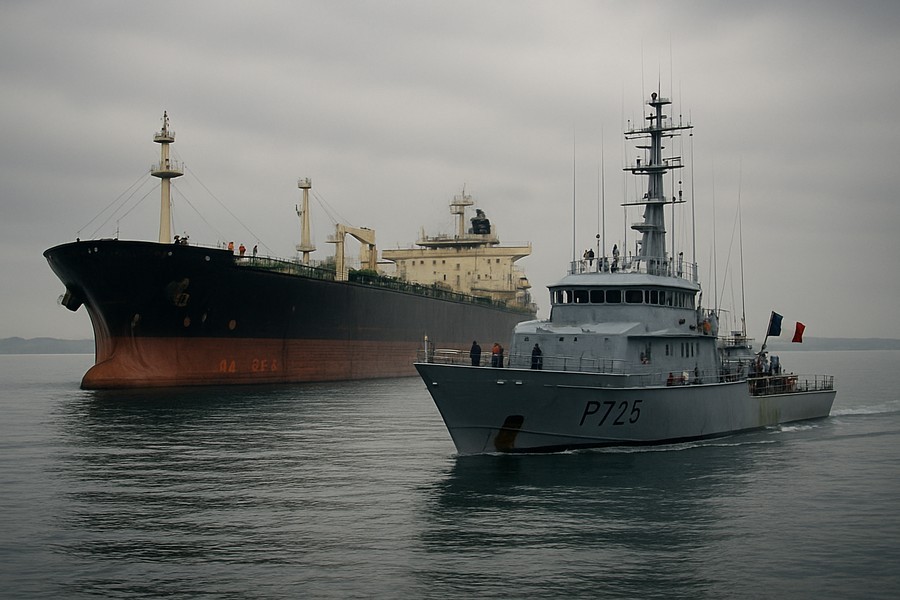
French Authorities Suspicious of Oil Tanker's Links to Russia's Clandestine Network
An oil tanker that was halted off the coast of France has attracted the critical eyes of French authorities. The French President has openly expressed his concerns about the ship's activities, hinting at a connection to Russia's covert fleet. This fleet is believed to be dodging Western sanctions, which have been enforced due to Russia's aggressive actions in Ukraine.
The oil tanker, which was found off the Danish coast last week, has been suspected of participating in unauthorized drone flights over the country, according to maritime experts.
Uncooperative Crew and Vessel Interception
A few days ago, French naval forces, acting on the directive of prosecutors who smelled foul play, stormed the oil tanker. The prosecutor's office located in the western French city of Brest has revealed that a legal inquiry has been initiated due to the crew's defiance and their inability to validate the nationality of the ship.
The vessel has been instructed to remain stationary for further investigation. French naval forces paid the ship another visit to deliver food and fuel to the ship's crew. This action was taken by an official who wished to remain anonymous due to the ongoing investigation.
The Ship's Journey and Macron's Response
The ship embarked on its journey from a Russian oil terminal located near Saint Petersburg. After sailing off the Danish coast, it settled off the coast of Saint-Nazaire, a western French port. The French President insinuated that the ship was halted due to the actions of French authorities, expressing satisfaction that the ship's journey was interrupted.
"The crew of this ship has committed some grave infractions, which is why legal action is being taken," the French President stated during a gathering of European Union leaders in Denmark.
Shadow Fleet: An Ongoing Problem
The Danish Prime Minister refrained from commenting on specific investigations when asked about the ship's possible connection to drone incidents in Denmark and reports of two crew members being detained. However, she did acknowledge the persistent issues related to the shadow fleet, especially in the Baltic Sea, and emphasized the collaborative efforts to tackle this situation.
The shadow fleet has previously caused significant concerns. An oil tanker from the shadow fleet sparked a nationwide alert in Finland after it was suspected of intentionally severing an essential undersea electric cable located 50 miles off the coast. An exhaustive investigation later revealed that a major Russian oil company obscured its ownership of the tanker behind multiple shell companies to dodge Western sanctions.
In response to this incident, NATO initiated "Baltic Sentry", deploying ships and planes to keep an eye on the shadow fleet and protect crucial seabed infrastructure. Since the initiation of this operation, there have not been any more cable-cutting incidents.
Unveiling the Shadow Fleet
The continued occurrence of such incidents, however, underscores "the existence and the reality of a phenomenon that we have been describing and denouncing for a long time," as the French President put it. This is the infamous "shadow fleet", which contributes significantly to Russia's budget and is believed to finance approximately 40% of Russia's war efforts.
The tanker, which has changed its name multiple times and is now known as "Pushpa" or "Boracay", was sailing under the flag of Benin and is included in a list of ships targeted by EU sanctions against Russia.
The shadow fleet is primarily composed of old tankers, usually purchased by opaque entities registered in non-sanctioning countries, and sail under flags from non-sanctioning countries. Their purpose is to assist Russia's oil exporters in evading the price cap enforced by Ukraine's allies.
